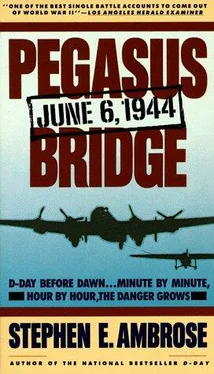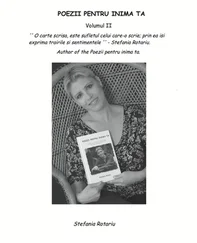Stephen Ambrose - Pegasus Bridge
Здесь есть возможность читать онлайн «Stephen Ambrose - Pegasus Bridge» весь текст электронной книги совершенно бесплатно (целиком полную версию без сокращений). В некоторых случаях можно слушать аудио, скачать через торрент в формате fb2 и присутствует краткое содержание. Жанр: История, на английском языке. Описание произведения, (предисловие) а так же отзывы посетителей доступны на портале библиотеки ЛибКат.
- Название:Pegasus Bridge
- Автор:
- Жанр:
- Год:неизвестен
- ISBN:нет данных
- Рейтинг книги:5 / 5. Голосов: 1
-
Избранное:Добавить в избранное
- Отзывы:
-
Ваша оценка:
- 100
- 1
- 2
- 3
- 4
- 5
Pegasus Bridge: краткое содержание, описание и аннотация
Предлагаем к чтению аннотацию, описание, краткое содержание или предисловие (зависит от того, что написал сам автор книги «Pegasus Bridge»). Если вы не нашли необходимую информацию о книге — напишите в комментариях, мы постараемся отыскать её.
Pegasus Bridge — читать онлайн бесплатно полную книгу (весь текст) целиком
Ниже представлен текст книги, разбитый по страницам. Система сохранения места последней прочитанной страницы, позволяет с удобством читать онлайн бесплатно книгу «Pegasus Bridge», без необходимости каждый раз заново искать на чём Вы остановились. Поставьте закладку, и сможете в любой момент перейти на страницу, на которой закончили чтение.
Интервал:
Закладка:
Howard's emphasis on technical training went a bit beyond what the other company commanders were doing, but only just a bit. Each of Howard's associates were commanding top-quality volunteers, and were volunteers themselves, outstanding officers. What was different about D Company was its commander's mania for physical fitness. It went beyond anything anyone in the regiment had ever seen before. All the regiment prided itself on being fit (one officer from B Company described himself as a physical-fitness fanatic), but all were amazed, and a bit critical, of the way Howard pushed his company fitness programme.
D Company's day began with a five-mile cross-country run, done at a speed of seven or eight minutes to the mile. After that the men dressed, ate breakfast, and then spent the day on training exercises, usually strenuous. In the late afternoon, Howard insisted that everyone engage in some sport or another. His own favourites were the individual endeavours, crosscountry running, swimming, and boxing, but he encouraged football, rugby, and any sport that would keep his lads active until bedtime.
Those were regular days. Twice a month, Howard would take the whole company out for two or three days, doing field\ exercises, sleeping rough. He put them through gruelling marches and soon they became an outstanding marching unit. Wally Parr swears - and a number of his comrades back him up - that they could do twenty-two miles, in full pack, including the Brens, mortars and ammunition, in under five and one-half hours. When they got back from such a march. Parr relates, 'you would have a foot inspection, get a bite to eat, and then in the afternoon face a choice: either play football or go for a cross-country run'.
All the officers, including Howard, did everything the men did. All of them had been athletes themselves, and loved sports and competition. The sports and the shared misery on the forced marches were bringing officers and men closer together. David Wood was exceedingly popular with his platoon, as was Tod Sweeney, in his own quiet way, with his. But Brotheridge stood out. He played the men's game, football, and as a former corporal himself he had no sense of being ill at ease among the men. He would come into their barracks at night, sit on the bed of his batman. Billy Gray, and talk football with the lads. He got to bringing his boots along, and shining them as he talked. Wally Parr never got over the sight of a British lieutenant polishing his boots himself while his batman lay back on his bed, gassing on about Manchester United and West Ham and other football teams.
Howard's biggest problem was boredom. He wracked his brains to find different ways of doing the same things, to put some spontaneity into the training. His young heroes had many virtues, but patience was not one of them. The resulting morale problem extended far beyond D Company, obviously, and late in the summer of 1942, General Gale sent the whole regiment to Devonshire for two months of cliff climbing, and other strenuous training. He then decided to march the regiment back to Bulford, some 130 miles. Naturally, it would be a competition between the companies.
The first two days were the hottest of the summer, and the men were marching in serge, ringing with sweat. After the second day, they pleaded for permission to change to lighter gear. It was granted, and over the next two days a cold, hard rain beat down on their inadequately-covered bodies.
Howard marched up and down the column, urging his men on. He had a walking stick, an old army one with an inch of brass on the bottom. His company clerk and wireless operator, Corporal Tappenden, offered the major the use of his bike. He refused, growling. 'I'm leading my company'. From gripping the stick his hands grew more blisters than Tappenden's feet, and he wore away all the brass on the end of it. But he kept marching.
On the morning of the fourth day, when Howard roused the men and ordered them to fall in, Wally Parr and his friend Jack Bailey waddled out on their knees. When Howard asked them what they thought they were doing, Wally replied that he and Jack had worn away the bottom half of their legs. But they got up and marched. 'Mad bastard', the men whispered among themselves after Howard had moved off. 'Mad, ambitious bastard. He'll get us all killed.' But they marched.
D Company got back to base on the evening of the fifth day, marching in at 145 steps to the minute and singing 'Onward Christian Soldiers'. Loudly. They came in first in the regiment, by half a day. Howard had lost only two men out of 120. (His stick, however, became so worn that he had to throw it away.)
Howard had radioed ahead, and had hot showers and meals waiting for the men. As the officers began to undress for their showers, Howard told them to button up. They had to go do a foot inspection of the men, then watch to make sure they all showered properly, check on the quality and quantity of their food, and inspect the barracks to see that the beds were ready. By the time the officers got to shower, the hot water was gone; by the time they got to eat, only cold leftovers remained. But not a one of them had let Howard down.
'From then on', Howard recalls, 'we didn't follow the normal pattern of training.' His colonel gave him even more flexibility, and the transport to make it meaningful. Howard started taking his company to Southampton, or London, or Portsmouth, to conduct street fighting exercises in the bombed-out areas. There were plenty to choose from, and it did not matter how much damage D Company did, so all the exercises were with live ammunition.
Howard was putting together an oustanding light infantry company.
CHAPTER THREE
D-Day minus one year to D-Day minus one month
By the spring of 1943, the British airborne force had become large enough to be divided into two divisions. The 1st Airborne went off to North Africa while the 6th (the number was chosen to confuse German intelligence) was formed around the units that stayed behind, including the Ox and Bucks and D Company.
General Richard Gale, known to everyone as 'Windy' because of his last name, commanded 6th Airborne Division. A large, confident, experienced officer who had commanded the 1st Para Brigade, Gale had a bit of the buccaneer about him, and more than a bit of imagination to complement his professionalism.
Nigel Poett commanded the 5th Para Brigade. He was a regular officer from the Durham Light Infantry. A big, powerful man, Poett was meticulous on detail and an officer who led from the front. The 3rd Para Brigade was commanded by James Hill, a regular from the Royal Fusiliers who had won a DSO in North Africa. D Company was a part of the Airland-ing Brigade, commanded by Brigadier Hugh Kindersley.[1] --- [1] After the war Kindersley became chairman of Rolls-Royce and was made a peer.
Training intensified under Gale's prodding, but there were few complaints because the word was that the division was being prepared for the invasion of France. Gale, through his training exercises, was trying to figure out what the division was capable of performing, while simultaneously trying to figure out exactly how he would use it to achieve his D-Day objectives.
At COSSAC (Chief of Staff, Supreme Allied Command), planning for Gale's role, and for the invasion as a whole, had been going on for a year, under the direction of General Frederick Morgan. By the spring of 1943, Morgan and his planners had settled on Normandy, west of the mouth of the Orne River, as the invasion site. A variety of factors influenced the choice; the one that affected D Company and the 6th Airborne Division was the need to protect the left flank of the seaborne invasion, where the British 3rd Division would be landing on Sword Beach. That left flank was the single most vulnerable point in the whole invasion, because to the east, beyond Le Havre and the mouth of the Seine River, the Germans had the bulk of their armour in the West. If Rommel brought that armour across the Seine, crossed the River Dives and the Orne River, then launched an all-out counter-attack against the exposed flank of 3rd Division, he might well roll up the entire invading force, division by division. It would take days for the Allies to unload enough tanks and artillery of their own to withstand such a blow.
Читать дальшеИнтервал:
Закладка:
Похожие книги на «Pegasus Bridge»
Представляем Вашему вниманию похожие книги на «Pegasus Bridge» списком для выбора. Мы отобрали схожую по названию и смыслу литературу в надежде предоставить читателям больше вариантов отыскать новые, интересные, ещё непрочитанные произведения.
Обсуждение, отзывы о книге «Pegasus Bridge» и просто собственные мнения читателей. Оставьте ваши комментарии, напишите, что Вы думаете о произведении, его смысле или главных героях. Укажите что конкретно понравилось, а что нет, и почему Вы так считаете.




![Stephen Ambrose - Citizen Soldiers [Condensed]](/books/346737/stephen-ambrose-citizen-soldiers-condensed-thumb.webp)




